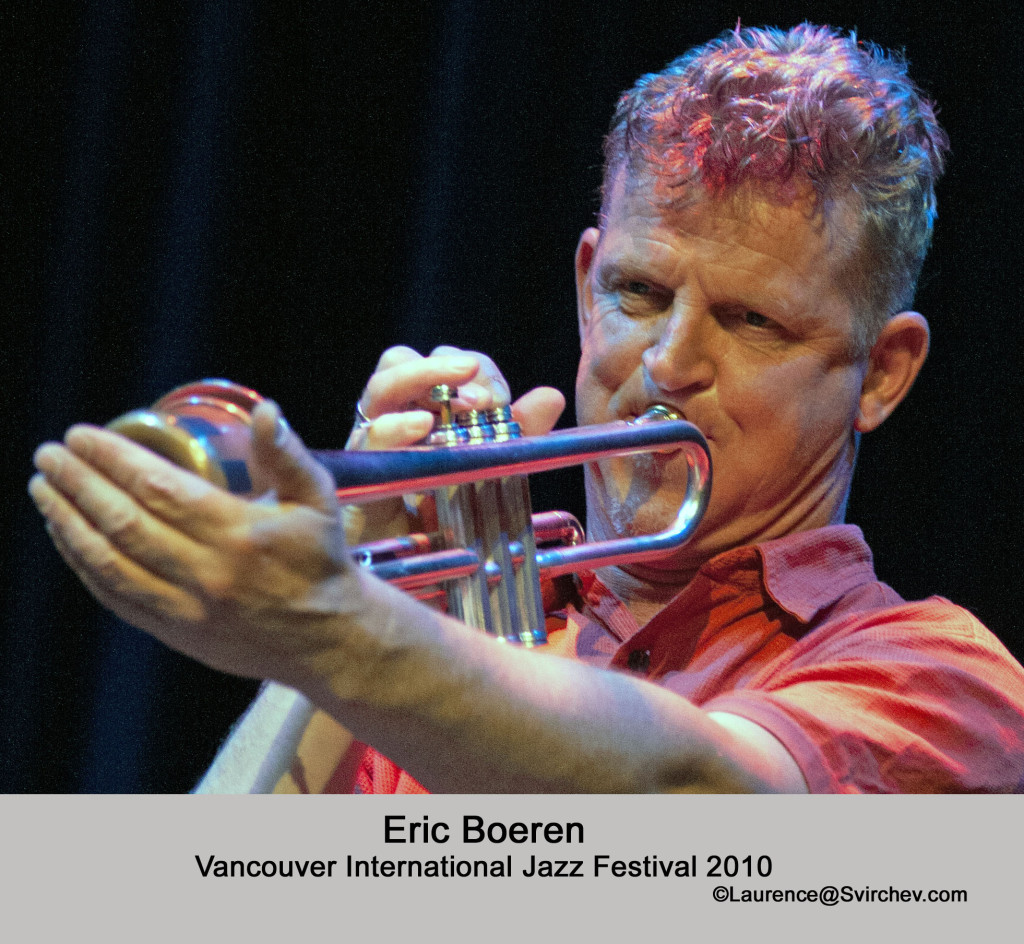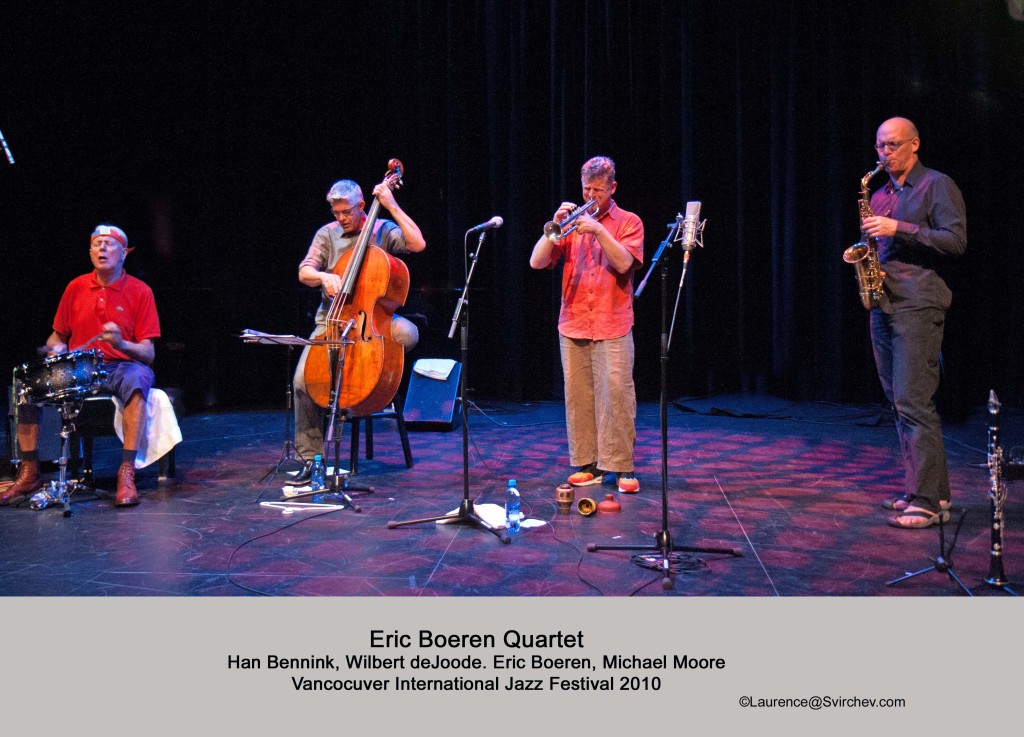 At the 2010 Vancouver Festival, Eric Boeren’s 4Tet of Michael Moore (reeds), Wilbert deJoode (bass), and Han Bennink (drums) glided through an early Ornette Coleman (1930-2015) repertoire segmented into six pieces. Each piece contained multiple compositions and interpretations that made the difficult music seem as easy to execute as understanding the elegant explanation of quantum mechanics contained in Richard Feynman’s little book ”Six Easy Pieces”.
At the 2010 Vancouver Festival, Eric Boeren’s 4Tet of Michael Moore (reeds), Wilbert deJoode (bass), and Han Bennink (drums) glided through an early Ornette Coleman (1930-2015) repertoire segmented into six pieces. Each piece contained multiple compositions and interpretations that made the difficult music seem as easy to execute as understanding the elegant explanation of quantum mechanics contained in Richard Feynman’s little book ”Six Easy Pieces”.
At the 30th TD International Jazz Festival, Boeren has a couple of gigs at the Ironworks, one with the 4Tet playing their own repertoire, which includes Ornette Coleman in the mix. The second gig is an Octet playing “All Ellington” with Moore and deJoode, plus Dylan van der Schyff in the drum chair, John Paton (saxes), Jon Bentley (tenor sax), JP Carter (trumpet), and Rod Murray (trombone).
Casting the debonair spell of Ellington is a different story than elucidating the seductive charm of Ornette Coleman. For one, Coleman has closer generational influence than Ellington. Around the time Coleman began exercising his influence (at first to disdain, then to dismay, then to honor, and now to the ages), Ellington was at the end of his life (1899-1974). So I asked Boeren a simple question about reaching further back, “Why Ellington?”
Boeren is a thoughtful guy. From Amsterdam he wrote a two word tit-for-tat answer. In a tone as genteel as the sound of his cornet he wrote, “Why Not?”
Of course there is more to it than a why not. By any musical standard, Ellington ranks among the great composers of any time or place. Between 1923 and 1973 he composed over eleven hundred individual pieces of music, many of them combined into suites such as Black, Brown, and Beige, The Degas Suite, The River, and countless compositions that star-crossed lovers danced to. Queens, presidents, and shahs a laid down their petty affairs of state to attend an Ellington concert, not to mention the mobsters who funded Ellington’s early club years.
Careful Ellington was, sly too. He was the guy who wrote, “You can say anything you want on a trombone, but you have to be very careful with words.” In his autobiography Music Is My Mistress, he wrote “‘Jazz’ is only a word and really has no meaning. We stopped using it in 1943. To keep the whole thing clear, once and for all, I don’t believe in categories of any kind,” adding “Music is limitless.” He lived that formulation, consistently ignored boundaries, and crossed with aplomb those set set by lesser wits.
He was a musician who could not help but write shamanistically when he felt the need, such as, “Composers try to parallel observations through all the senses”, an accurate assessment of how he worked. For example, he composed ‘Northern Lights’ while watching the aurora borealis during an overnight drive from one Canadian gig to another, baritone saxophonist Harry Carney at the wheel. If he had one regret in life it is that he did did not paint, which was his first artistic desire. Edward Kennedy Ellington prepared his spiritual legacy well, never deviating from his deeply held spiritual convictions, his last works being the under-rated Sacred Concerts.in the modern world of creative music no one can touch the scope size, grandeur, and longevity of the Ellington Orchestra and no other orchestra had such a stellar cast of soloists.
Boeren didn’t stop at the ‘Why Not?’ question. He said, ”There is lots to be found in the Ellington canon for later generations to work with and develop.” To tackle the Ellington canon, Boeren did with Ellington what he done with Coleman’s music: work out a repertoire not as a short term goal but as a long term concept. With deJoode and Moore he has been involved in a monthly series in Amsterdam called “All Ellington.” Over the course of two seasons they developed a book of more then eighty Ellington-related arrangements.
The 4Tet have 15 years experience as an ensemble, and as Boeren said, “Over the long time we have been working together we have developed an understanding the use and the ‘power’ of musical cues so we can change direction all the time.” The cues may be subtle and not identified by the audience, the mysterious telesthesia inherent to communication among master musicians.
Boeren explained, “In some of the tunes there is space for improvisation written in. That could be a bridge or a moment meant to elaborate on some of the melodious material. A quote from some other tune, or a change of tempo, or the introduction of a turnaround that is not related to the tune at hand, might hint towards moving on to another composition. We might not be in accordance at that very moment, which means we have to negotiate a solution within the music. Thus the compositions have become an integrated part of the improvisations. Playing in this way asks a lot from the musicians: we have to be very alert. Always!”
Boeren is emphatic that trying to copy Ellington’s sound is a no-go zone, so “we re-arranged the material so it fits us,” a one-to-one correspondence with Ellington’s statement that he composed “to fit the tonal personalities of the individual instrumentalists who have the responsibility of interpreting our works.” The Boeren Octet’s interpretation will of course be open, but expect material from the “Far East Suite,” “Such Sweet Thunder” (Ellington’s take on Shakespeare), and the rarely performed “Perfume Suite”.
Adding five Vancouver musicians into the “All Ellington” performance naturally gains aspects of Ellington’s instrumental sound palette, minus the piano. More importantly, the Vancouver musicians have the chops, energy, and improvisational energy of the Amsterdam guys. I’m guessing the wild tone poem Coloratura will be a feature from the “Perfume Suite”. I’m further predicting musical masquerades, lead-ins that harbor and only hint at the true intent of the melodic content, subsequent surprising revelations, floating on gossamer wings, and sagacious surprises. Edward Kennedy Ellington and Ornette Coleman are no longer with us in person but Eric Boeren and colleagues are certain to invoke the spirits of these two Herculean musicians.
Where: Ironworks, Gastown, 235 Alexander Street
4Tet Time: Friday June 26, 19:30
“All Ellington” Octet: Saturday June 27, 23:30
Check the Festival Program for Eric Boeren workshops and gigs related to other members of the 4Tet.
Eric Boeren” Website: http://eb.home.xs4all.nl/ericboeren.html
©Laurence Svirchev
